- Home
- Octavia E. Butler
Bloodchild and Other Stories Page 12
Bloodchild and Other Stories Read online
Page 12
She herself was enjoying the rare comfort of wearing shoes, long black cotton pants, and a colorful flowing tunic. And there was furniture designed for the human body—an upholstered armchair with a high back and a table she could eat from or rest her arms on. She had no such furniture in her quarters within the Mojave Bubble. She suspected that she could have at least the furniture now, if she asked her employer for it, but she had not asked, would not ask. Human things were for human places.
“But what does a contract mean to things that come from another star system?” Michelle Ota demanded.
Rune Johnsen spoke up. “Yes, it’s interesting how quickly these beings have taken up local, terrestrial ways when it suits them. Translator, do you truly believe they will consider themselves bound by anything they sign? Although without hands, God knows how they manage to sign anything.”
“They will consider both themselves and you bound by it if both they and you sign it,” Noah said. “And, yes, they can make highly individual marks that serve as signatures. They spent a great deal of their time and wealth in this country with translators, lawyers, and politicians, working things out so that each Community was counted as a legal ‘person,’ whose individual mark would be accepted. And for twenty years since then, they’ve honored their contracts.”
Rune Johnsen shook his blond head. “In all, they’ve been on earth longer than I’ve been alive, and yet it feels wrong that they’re here. It feels wrong that they exist. I don’t even hate them, and still it feels wrong. I suppose that’s because we’ve been displaced again from the center of the universe. We human beings, I mean. Down through history, in myth and even in science, we’ve kept putting ourselves in the center, and then being evicted.”
Noah smiled, surprised and pleased. “I noticed the same thing. Now we find ourselves in a kind of sibling rivalry with the Communities. There is other intelligent life. The universe has other children. We knew it, but until they arrived here, we could pretend otherwise.”
“That’s crap!” another woman said. Thera Collier, her name was, a big, angry, red-haired young woman. “The weeds came here uninvited, stole our land, and kidnapped our people,” She had been eating an apple. She slammed it down hard on the table, crushing what was left of it, spattering juice. “That’s what we need to remember. That’s what we need to do something about.”
“Do what?” Another woman asked. “We’re here to get jobs, not fight.”
Noah searched her memory for the new speaker’s name and found it. Piedad Ruiz—a small, brown woman who spoke English clearly, but with a strong Spanish accent. She looked with her bruised face and arms as though she had taken a fairly serious beating recently, but when Noah had asked her about it before the group came into the meeting room, she held her head up and said she was fine and it was nothing. Probably someone had not wanted her to apply for work at the bubble. Considering the rumors that were sometimes spread about the Communities and why they hired human beings, that was not surprising.
“What have the aliens told you about their coming here, Translator,” Rune Johnsen asked. He was, Noah remembered from her reading of the short biography that had been given to her with his job application, the son of a small businessman whose clothing store had not survived the depression brought about by the arrival of the Communities. He wanted to look after his parents and he wanted to get married. Ironically, the answer to both those problems seemed to be to go to work for the Communities for a while. “You’re old enough to remember the things they did when they arrived,” he said. “What did they tell you about why they abducted people, killed people.…”
“They abducted me,” Noah admitted.
That silenced the room for several seconds. Each of the six potential recruits stared at her, perhaps wondering or pitying, judging or worrying, perhaps even recoiling in horror, suspicion, or disgust. She had received all these reactions from recruits and from others who knew her history. People had never been able to be neutral about abductees. Noah tended to use her history as a way to start questions, accusations, and perhaps thought.
“Noah Cannon,” Rune Johnsen said, proving that he had at least been listening when she introduced herself. “I thought that name sounded familiar. You were part of the second wave of abductions. I remember seeing your name on the lists of abductees. I noticed it because you were listed as female. I had never run across a woman named Noah before.”
“So they kidnapped you, and now you work for them?” This was James Hunter Adio, a tall, lean, angry-looking young black man. Noah was black herself and yet James Adio had apparently decided the moment they met that he didn’t like her. Now he looked not only angry, but disgusted.
“I was eleven when I was taken,” Noah said. She looked at Rune Johnsen. “You’re right. I was part of the second wave.”
“So what, then, they experimented on you?” James Adio asked.
Noah met his gaze. “They did, yes. The people of the first wave suffered the most. The Communities didn’t know anything about us. They killed some of us with experiments and dietary deficiency diseases and they poisoned others. By the time they snatched me, they at least knew enough not to kill me by accident.”
“And what? You forgive them for what they did do?”
“Are you angry with me, Mr. Adio, or are you angry in my behalf?”
“I’m angry because I have to be here!” he said. He stood up and paced around the table—all the way around twice before he would sit down again. “I’m angry that these things, these weeds can invade us, wreck our economies, send the whole world into a depression just by showing up. They do whatever they want to us, and instead of killing them, all I can do is ask them for a job!” And he needed the job badly. Noah had read the information collected about him when he first applied to work for the Communities. At twenty, James Adio was the oldest of seven children, and the only one who had reached adulthood so far. He needed a job to help his younger brothers and sisters survive. Yet Noah suspected that he would hate the aliens almost as much if they hired him as if they turned him down.
“How can you work for them?” Piedad Ruiz whispered to Noah. “They hurt you. Don’t you hate them? I think I’d hate them if it were me.”
“They wanted to understand us and communicate with us,” Noah said. “They wanted to know how we got along with one another and they needed to know how much we could bear of what was normal for them.”
“Is that what they told you?” Thera Collier demanded. With one hand, she swept her smashed apple off the table onto the floor, and then glared at Noah as though wishing she could sweep her away too. Watching her, Noah realized that Thera Collier was a very frightened woman. Well, they were all frightened, but Thera’s fear made her lash out at people.
“The Communities did tell me that,” Noah admitted, “but not until some of them and some of us, the surviving captives, had managed to put together a code—the beginnings of a language—that got communication started. Back when they captured me, they couldn’t tell me anything.”
Thera snorted. “Right. They can figure out how to cross light years of space, but they can’t figure out how to talk to us without torturing us first!”
Noah allowed herself a moment of irritation. “You weren’t there, Ms. Collier. It happened before you were born. And it happened to me, not to you.” And it hadn’t happened to anyone in Thera Collier’s family either. Noah had checked. None of these people were relatives of abductees. It was important to know that since relatives sometimes tried to take revenge on translators when they realized they weren’t going to be able to hurt the Communities.
“It happened to a lot of people,” Thera Collier said. “And it shouldn’t have happened to anyone.”
Noah shrugged.
“Don’t you hate them for what they did to you?” Piedad whispered. Whispering seemed to be her normal way of speaking.
“I don’t,” Noah said. “I did once, especially when they were beginning to understand us a little, and
yet went right on putting us through hell. They were like human scientists experimenting with lab animals—not cruel, but very thorough.”
“Animals again,” Michelle Ota said. “You said they—”
“Then,” Noah told her. “Not now.”
“Why do you defend them?” Thera demanded. “They invaded our world. They tortured our people. They do whatever they please, and we aren’t even sure what they look like.”
Rune Johnsen spoke up, to Noah’s relief. “What do they look like, Translator? You’ve seen them close up.”
Noah almost smiled. What did the Communities look like. That was usually the first question asked in a group like this. People tended to assume, no matter what they had seen or heard from media sources, that each Community was actually an individual being shaped like a big bush or tree or, more likely, that the being was wearing shrubbery as clothing or as a disguise.
“They’re not like anything that any of us have ever known,” she told them. “I’ve heard them compared to sea urchins—completely wrong. I’ve also heard they were like swarms of bees or wasps—also wrong, but closer. I think of them as what I usually call them—Communities. Each Community contains several hundred individuals—an intelligent multitude. But that’s wrong too, really. The individuals can’t really survive independently, but they can leave one community and move temporarily or permanently to another. They are products of a completely different evolution. When I look at them, I see what you’ve all seen: outer branches and then darkness. Flashes of light and movement within. Do you want to hear more?”
They nodded, sat forward attentively except for James Adio who leaned back with an expression of contempt on his dark, smooth young face.
“The substance of the things that look like branches and the things that look like leaves and mosses and vines is alive and made up of individuals. It only looks like a plant of some sort. The various entities that we can reach from the outside feel dry, and usually smooth. One normal-sized Community might fill half of this room, but only weigh about six to eight hundred pounds. They aren’t solid, of course, and within them, there are entities that I’ve never seen. Being enveloped by a community is like being held in a sort of … comfortable strait jacket, if you can imagine such a thing. You can’t move much. You can’t move at all unless the Community permits it. You can’t see anything. There’s no smell. Somehow, though, after the first time, it isn’t frightening. It’s peaceful and pleasant. I don’t know why it should be, but it is.”
“Hypnosis,” James Adio said at once. “Or drugs!”
“Definitely not,” Noah said. At least this was something she could be sure of. “That was one of the hardest parts of being a captive of the Communities. Until they got to know us, they didn’t have anything like hypnosis or mood-altering drugs. They didn’t even have the concept.”
Rune Johnsen turned to frown at her. “What concept?”
“Altered consciousness. They don’t even go unconscious unless they’re sick or injured, and a whole Community never goes unconscious even though several of its entities might. As a result, Communities can’t really be said to sleep—although at long last, they’ve accepted the reallty that we have to sleep. Inadvertently, we’ve introduced them to something brand new.”
“Will they let us bring medicine in?” Michelle Ota asked suddenly. “I have allergies and I really need my medicine.”
“They will allow certain medicines. If you’re offered a contract, you’ll have to write in the drugs you’ll need. They will either allow you to have the drugs or you won’t be hired. If what you need is allowed, you’ll be permitted to order it from outside. The Communities will check to see that it is what it’s supposed to be, but other than that, they won’t bother you about it. Medicine’s just about all you’ll have to spend money on while you’re inside. Room and board are part of the agreement, of course, and you won’t be allowed to leave your employers until your contract is up.”
“What if we get sick or have an accident?” Piedad demanded. “What if we need some medicine that isn’t in the contract.”
“Medical emergencies are covered by the contract,” Noah said.
Thera slapped her palms down against the table and said loudly, “Screw all that!” She got the attention she wanted. Everyone turned to look at her. “I want to know more about you, and the weeds, Translator. In particular, I want to know why you’re still here, working for things that probably put you through hell. Part of that no drug thing was no anesthetic when they hurt you, right?”
Noah sat still for a moment, remembering, yet not wanting to remember. “Yes,” she said at last, “except that most of the time, the people actually hurting me were other human beings. The aliens used to lock groups of two or more of us up together for days or weeks to see what would happen. This was usually not too bad. Sometimes, though, it went wrong. Some of us went out of our minds. Hell, all of us went out of our minds at one time or another. But some of us were more likely than others to be violent. Then there were those of us who would have been thugs even without the Communities’ help. They were quick enough to take advantage of any chance to exercise a little power, get a little pleasure by making another person suffer. And some of us just stopped caring, stopped fighting, sometimes even stopped eating. The pregnancies and several of the killings came from those cell-mate experiments. We called them that.
“It was almost easier when the aliens just made us solve puzzles to get food or when they put things in our food that made us sick or when they enfolded us and introduced some nearly lethal substance into our bodies. The first captives got most of that, poor people. And some of them had developed a phobic terror of being enfolded. They were lucky if that was all they developed.”
“My God,” Thera said, shaking her head in disgust. After a while, she asked, “What happened to the babies? You said some people got pregnant.”
“The Communities don’t reproduce the way we do. It didn’t seem to occur to them for a long time to take it easy on the pregnant women. Because of that, most women who got pregnant miscarried. Some had still births. Four of the women in the group that I was usually caged with between experiments died in childbirth. None of us knew how to help them.” That was another memory she wanted to turn away from.
“There were a few live births, and of those, a few babies survived infancy, even though their mothers couldn’t protect them from the worst and the craziest of our own people or from the Communities who were … curious about them. In all thirty-seven of the world’s bubbles, fewer than a hundred such children survived. Most of those have grown up to be reasonably sane adults. Some live outside in secret, and some will never leave the bubbles. Their choice. A few of them are becoming the best of the next generation of translators.”
Rune Johnsen made a wordless sound of interest. “I’ve read about such children,” he said.
“We tried to find some of them,” Sorrel Trent said, speaking up for the first time. “Our leader teaches that they’re the ones who will show us the way. They’re so important, and yet our stupid government keeps them hidden!” She sounded both frustrated and angry.
“The governments of this world have a great deal to answer for,” Noah said. “In some countries, the children won’t come out of the bubbles because word has gotten back to them about what’s happened to those who have come out. Word about disappearances, imprisonment, torture, death. Our government seems not to be doing that sort of thing any more. Not to the children, anyway. It’s given them new identities to hide them from groups who want to worship them or kill them or set them apart. I’ve checked on some of them myself. They’re all right, and they want to be let alone.”
“My group doesn’t want to hurt them,” Sorrel Trent said. “We want to honor them and help them fulfill their true destiny.”
Noah turned away from the woman, her mind filled with caustic, unprofessional things best not said. “So the children at least, are able to have a little peace,” she did say
.
“Is one of them yours?” Thera asked, her voice uncharacteristically soft. “Do you have children?”
Noah stared at her, then leaned her head against the chair back again. “I got pregnant when I was fifteen and again when I was seventeen. Miscarriages both times, thank God.”
“It was … rape?” Rune Johnsen asked.
“Of course it was rape! Can you actually believe I’d want to give the Communities another human infant to study?” She stopped and took a deep breath. After a moment, she said, “Some of the deaths were women killed for resisting rape. Some of the deaths were rapists. Do you remember an old experiment in which too many rats are caged together and they begin to kill one another.”
“But you weren’t rats,” Thera said. “You were intelligent. You could see what the weeds were doing to you. You didn’t have to—”
Noah cut her off. “I didn’t have to what?”
Thera backpedaled. “I didn’t mean you personally. I just mean human beings ought to be able to behave better than a bunch of rats.”
“Many did. Some did not.”
“And in spite of all that, you work for the aliens. You forgive them because they didn’t know what they were doing. Is that it?”
“They’re here,” Noah said flatly.
“They’re here until we find a way to drive them away!”
“They’re here to stay,” Noah said more softly. “There’s no ‘away’ for them—not for several generations anyway. Their ship was a one-way transport. They’ve settled here and they’ll fight to keep the various desert locations they’ve chosen for their bubbles. If they do decide to fight, we won’t survive. They might be destroyed too, but chances are, they would send their young deep into the ground for a few centuries. When they came up, this would be their world. We would be gone.” She looked at each member of the group. “They’re here,” she said for the third time. “I’m one of maybe thirty people in this country who can talk to them. Where else would I be but here at a bubble, trying to help the two species understand and accept one another before one of them does something fatal?”

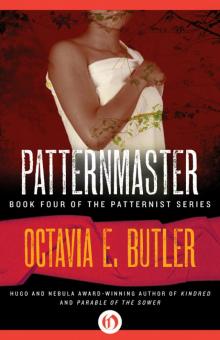 Patternmaster
Patternmaster Survivor
Survivor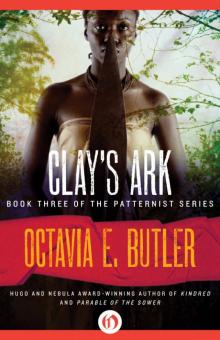 Clay's Ark
Clay's Ark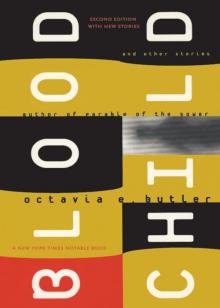 Bloodchild and Other Stories
Bloodchild and Other Stories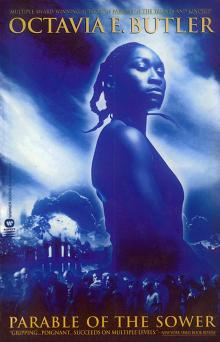 Parable of the Sower
Parable of the Sower Wild Seed
Wild Seed Fledgling
Fledgling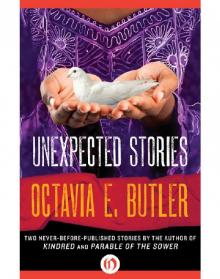 Unexpected Stories
Unexpected Stories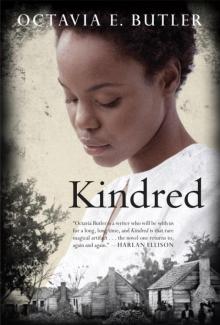 Kindred
Kindred Lilith's Brood: Dawn / Adulthood Rites / Imago
Lilith's Brood: Dawn / Adulthood Rites / Imago Adulthood Rites
Adulthood Rites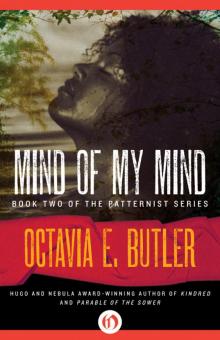 Mind of My Mind
Mind of My Mind Seed to Harvest
Seed to Harvest Lilith's Brood: Dawn, Adulthood Rites, and Imago (Xenogenesis Trilogy)
Lilith's Brood: Dawn, Adulthood Rites, and Imago (Xenogenesis Trilogy)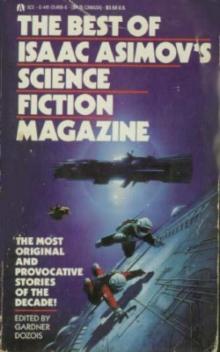 Bloodchild
Bloodchild Seed to Harvest: Wild Seed, Mind of My Mind, Clay's Ark, and Patternmaster (Patternist)
Seed to Harvest: Wild Seed, Mind of My Mind, Clay's Ark, and Patternmaster (Patternist)